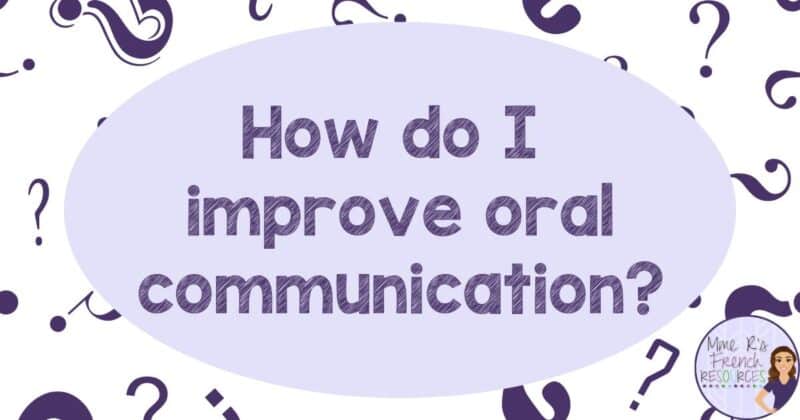
As a French teacher, one of the most common questions I get asked is how to improve oral communication in French. It’s a valid question, since getting students to speak the language they are learning is one of the main goals of any French class.
In this blog post, I’m answering some of the most frequently asked questions that I receive from Core French and French immersion teachers about how to improve oral communication in the French classroom.
One of the most important things to keep in mind when trying to get your students to speak French is that they need to feel comfortable doing so. This means creating a safe and supportive environment in your classroom where students feel like they can take risks without being judged. You’ll only improve their oral communication skills when they feel comfortable speaking!
So, what do teachers ask me the most?
1. What is your favorite French speaking activity?
I love French speaking cards, because there are so many things I can do with them! Some days, I like to do a structured activity like concentric circles or partner interviews. Other times, there are a few minutes to spare and I need something quick to do. It’s so easy to just grab a set of French speaking cards so you can ask a few questions. It saves me the energy of having to think of them on the spot!
This French conditional set is a fun way to practice more complicated grammar with a meaningful and structured activity. It’s a great way to practice oral communication skills with more advanced students.

2. How do I get students comfortable speaking French?
You should be using French yourself as much as possible. You want to show students that it is possible to communicate in French even if they are not a native speakers. Encourage students to use whatever French they know, even if it is not perfect.
Let them know them that everyone makes mistakes and that the only way to improve oral communication is by practicing. Also, make sure you are using plenty of scaffolding and support in your instruction so that students feel confident they can do the task you are asking of them. Here’s how I got started using the target language more.
3. Should I give participation points for speaking French?
I personally don’t. It’s too hard to assign a fair grade if I can’t really provide the data for exactly how much French each student speaks. I have usually taught 100+ kids, sometimes many more than that. It’s not fair to assign a grade in that case. I can tell you which kids speak a lot of French and which don’t make as much of an effort. However, I can’t remember specifics for everyone, and it’s way too hard to try and track the data on so many kids.
4. How can I correct their mistakes without frustrating them?
How many times have you heard a student say “Je suis fini!” ?
I like to correct them once by explaining what they said, and then I can usually give them an eyebrow raise when they say something like that in the future. More often than not, they can correct it right away.
As far as little mistakes, you don’t have to correct every single one. You can model the correct phrasing without making them feel as if they are being corrected. For example, imagine a student says, “Je n’ai pas un crayon.” You don’t have to correct them. You can just answer back, “Tu n’as pas de crayon? Voici un crayon que tu peux emprunter.” They’ll hear the correct form of the negation without feeling corrected. Over time, these little mistakes often correct themselves.
During assessments, this is the time to give students specific and positive feedback on their efforts to speak French. You can let them know what they are doing well and where they can improve their oral communication.
5. How do I get students to speak French when they work together?
This one is tough! It’s just not natural to speak another language when you have someone next to you who speaks your native language!
Rather than punishing students or constantly reminding them to speak French, I “catch” them doing it. Then, I’ll pass out a few reward tokens to students who are making a good effort, and they can “buy” rewards from me a few times a quarter.
Possible reward ideas:
–> a toy or treat from my candy box or treasure chest
–> a video (in French) that they’ve chosen to show the class – Have them send you the link first so you can make sure it’s appropriate. 🙂
–> a free home work pass
–>sitting with a friend for the day (or however long you decide)
I hope these tips help you in improve oral communication in your French classroom! f you have any other questions, feel free to leave them in the comments below.
À bientôt!



Leave a Reply